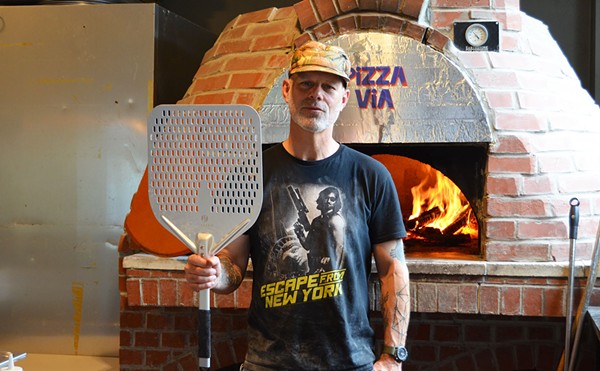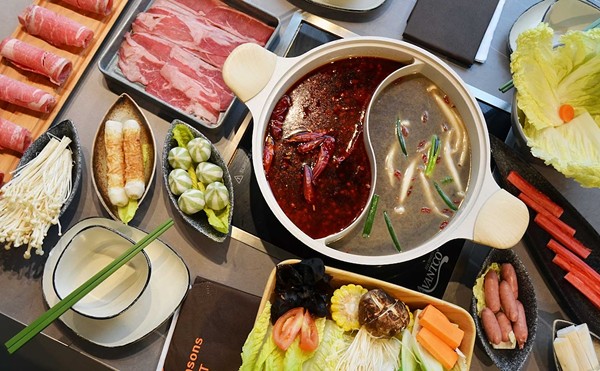The most exciting dish in St. Louis right now appears to be barbecue. I don't mean that as a blanket overview of the area's dining scene. I mean, literally, there is a specific dish at Salume Beddu that at first glance looks like barbecue: smoked pork ribs, to be precise. They are indeed pork ribs, but they are not smoked. The flavor is like nothing I've had before, beguiling — and delicious.
Of course, you know Salume Beddu for its artisanal cured meats. And if you don't, you ought to. Since 2008, first at farmers' markets and by special order, now from its shop on Hampton Avenue just north of Chippewa Street, founder Mark Sanfilippo — whose résumé includes Mozza, the acclaimed Los Angeles restaurant from chefs Nancy Silverton and Mario Batali — and right-hand man Ben Poremba have been rewriting St. Louisans' understanding of what cured meats can be, each creation an interplay of meat and spice as elegant and exquisite as a dish served in the finest restaurant.
Since the beginning of last month, Salume Beddu has offered a lunch menu: sandwiches, plates of their salumi with accompaniments, occasional specials like crêpes or those ribs. Calling it a restaurant might be a stretch. There are exactly two tables in the shop, one merely a two-top, and aside from a cook in the kitchen, there is no additional staff. The same person might take, prepare and serve your order. (Bus your own table, though.)
Why serve lunch?
"Public persuasion," laughs Poremba when I reach him on the phone. The sandwiches and plates make sense: Salume Beddu's salumi are the focal point. And the specials? Concedes Poremba, who has worked at local restaurants 609, Winslow's Home and the Maryland House at Brennan's: "I just can't help myself."
Though not quite two months old, Salume Beddu's lunch menu already boasts a signature item, the "Beast in a Box" sandwich, whose fans (including yours truly and Niche chef Gerard Craft) have been vociferously championing it through blogs and Twitter.
The "Beast" is Salume Beddu's fiama sausage, which by itself a beautiful thing: Fennel provides the dominant accent, with smoked Spanish paprika adding depth and a healthy dose of pepper giving it bite. This is topped with peperonata (seasoned, cooked peppers) and, to your taste, the shop's wonderfully pungent giardiniera.
These accompaniments don't merely complement the fiama sausage, they enhance its natural characteristics, pushing the flavor right to the very brink of being too much, without crossing the line. That's a risk few local chefs are willing to take, sad to say.
The "Box" is the bread. It is a lovely roll, with a gorgeous browned exterior and the ideal body to support the sausage and its toppings without being too heavy or sacrificing its own character and slight chew. This and the other sandwich rolls aren't made in-house but are baked by Alex Carlson, who oversaw the excellent bread program at Anthony Devoti's Five Bistro and now works by himself under the banner Red Guitar Bread.
Not content to tell you how much I love the "Beast in a Box," I asked Gerard Craft to weigh in. "Obviously, number one, the sausage is perfect," says the chef. "It's creamy, it's kind of spicy, and the casing's got a good snap to it. The giardiniera is amazing. It's tart, a little bit spicy. And all of it on a great bread roll. It's very simple, but I think it's perfect."
After we finish talking about the "Beast," Poremba's voice drops. "I probably shouldn't say this," he says hesitantly. "You know what? In my opinion it's not our best sandwich."
So what is the apple of Poremba's eye? He does not elaborate. But it might be the speck sandwich. The meat — prosciutto that's smoked after it's cured — is splendid by itself, with a luscious texture that seems to dissolve on your tongue. The speck is folded around fontina and preserved lemons. The cheese is there mostly for heft and texture (and perhaps a hint of its nutty flavor), but the gentle acidity and sweetness of the lemons provides a jolt to the palate. It made me think of the old elementary-school science experiment, where you unfold a paper clip, stick one end into a halved lemon and touch your tongue to the other end. Like a squeeze of lemon juice to finish a sauce, this shot of citrus allows the spices in the speck's cure to sing.
Then again, Poremba might be referring to the salami cotto sandwich, which receives a tannic buzz from the shop's fig tapenade, a blend of black mission figs with Kalamata and niçoise olives, garlic, balsamic vinegar and olive oil. Other sandwich combinations are straightforward and no less brilliant for it, like garlicky coppa and fresh mozzarella.
And then there are the ribs. The process begins with a dry rub called ras-el-hanout, a Moroccan blend of more than twenty different spices.
"My mother's from Morocco," Poremba explains. "And both Mark and I love spices — really the kind of mysteriousness of spices." Ras-el-hanout, he says, consists of "mostly spices that you would consider warm," such as mace, nutmeg, ginger, cardamom and clove. "It even has some ground-up rose petals to give it a floral quality."
After curing, the ribs are steamed at low temperature for three to four hours and then, when you order it, given a quick charring. The flavor is almost indescribable. An initial hit of olive oil and lemon slices through the browned exterior, then gives way to the complexity of the ras-el-hanout, whose warmth and pungency fills out the pork's natural blend of savor and sweetness. The meat is so tender that, again, if you didn't know, you might assume it had cooked low and slow over smoldering wood.
For added pop, on the side is a serving of Salume Beddu's sott' aceto, a bracing relish made from fennel, celery, chiles, mint and garlic, which are steeped in vinegar for anywhere from a couple of hours to a couple of days. This is also good eaten directly with a spoon, or so, um, I've been told.
The ribs aren't always available, so if you're desperate to try them, you might want to call ahead. Then again, everything here is worth trying. The word unique gets thrown around all too often (and nearly always misused), but even when Salume Beddu was "only" a salumeria, there was nothing like it in St. Louis.
Now that it serves lunch, too — well, unique is unique; nothing can be "more unique." But as good as it was, Beddu just got better.





